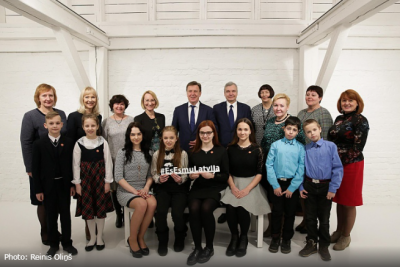The initiative „Latvian School Bag” is the biggest gift of Latvia to its more than 200 000 pupils. Starting September 2018, it will integrate exploration and experiencing of natural and cultural values, scientific achievements and successful business models into the school programmes and make it accessible to every schoolchild in Latvia. 13.5 million (40%) of planned additional funding of the Centenary state budget within five years are intended to cover the implementation of the integrated teaching programme as well as the related travel expenses and entrance tickets at the places of events.
The funding for the „Latvian School Bag” meaning 17 Euros per pupil each year will be forwarded to the local governments in proportion of the total number of pupils. The local governments together with schools will plan the most effective way of use of the funding.
An extensive research made last year by the Latvian Academy of Culture shows that one fifth of all pupils of Latvia have not visited any extracurricular cultural or regional studies event during the school year. The transportation costs and entrance ticket prices are the most often mentioned obstacles. Besides, many extracurricular activities depend very much on teachers’ competence or initiative. “Latvian School Bag” will solve these problems through providing the funding and offering a wide range of educational must-see events for pupils.
The implementation of the „Latvian School Bag” would let children from distant districts of Latvia visit the Latvian National Theatre in Riga – the place where the independent state of Latvia was founded, or the Latvian National Museum of Art, while children from Riga could visit the Curves of Daugava and Daugavpils Mark Rothko Art Centre or children from Vidzeme listen to a concert at the “Great Amber” Concert Hall in Liepāja, to give some examples.
„One of the most wonderful Centenary gifts is making things and places, which are significant to our country and nation, accessible to our children. Thereby, we will make sure that they get a real insight into the most important things,” said Prime Minister Māris Kučinskis, the Patron of the “Latvian School Bag”.
All Centenary events are created to strengthen the current values of Latvia, to create new lasting values for the future, and to launch long-term activities with special attention towards children and youth in all regions of Latvia.
„The Centenary is a great impulse for creating lasting values. Therefore, we want to give the biggest birthday gift to our children and youth. „Latvian School Bag” offers possibility to each schoolchild to experience Latvia, regardless of their location or financial capacity of their parents. Sense of belonging to our land and our country can be achieved through active participation and experiencing the natural and cultural values on the spot,” said Minister for Culture Dace Melbārde.
„This approach and the invested work give us insight into transition of the Latvian educational system to learning competences that we are going to introduce in schools starting from 2018. The contemporary approach, when learning takes place not only in the classroom, but also through practical experience, gives higher returns. That is why we will try to keep the “Latvian School Bag” into the school programmes after the Centenary as well,” said Minister of Education and Science Kārlis Šadurskis.
Māra Lāce, Director of the Latvian National Museum of Art: „A visit to the museum is very important when a person grows up. I would love to see how art becomes an integral part of every young person’s growing up. “Latvian School Bag” will encourage more frequent visits to the museums. It is wonderful; however, we have to admit that sometimes the huge amount of visitors force us to reject some of them, including some groups of pupils, or put them on a one-month-long waiting list. It is crucial to evaluate the real capacity of museums and other institutions participating in the project in order to strengthen it.”
Work on the project has lasted for several years under the Ministry of Culture. „Latvian School Bag” is inspired by the experience of Norway, where similar initiative has been carried out since 2001, as well as Portugal, Great Britain, Germany, and other countries. In September-December 2016, the pilot project took place in three regions – Riga, Broceni, and Daugavpils. For example, approximately 600 pupils participated in the pilot project in Broceni. They experienced different activities of theatre, music, visual arts, contemporary dance, architecture, cinema, literature, cultural heritage and regional studies.
Summarizing the information given by more than 670 state, local government or non-governmental cultural institutions who participated in the research, it is obvious that, in general, the range of offered cultural events is quite wide, but it covers the artistic and cultural sectors very unevenly. The lowest offer, especially for teenagers, is observed in music, theatre, design, architecture, and dance sectors.
More than 170 answers of different schools show that use of current offer is often non-consecutive and uncoordinated as it depends a lot on competence and initiative of the teacher. There is no clear general setting that experiencing culture and history outside of the classroom is very important part of educational process. Financial insufficiency is also one of the obstacles that cause discrimination among particular groups of pupils. That leads to the fact that more than 20% of all pupils have not participated in any extracurricular cultural or regional studies event during the school year.
To provide an integrated study process, it is necessary to create a diverse educational programme for different age groups. In March, the State Culture Capital Foundation will announce the culture projects’ competition for creating professional stage art (theatre, music, dance, circus, or interdisciplinary) for children and youth.
For more information please contact:
Linda Pastare
Latvian Centenary Bureau public relations specialist
67330339, 29374438
Linda.Pastare@km.gov.lv
www.lv100.lv



